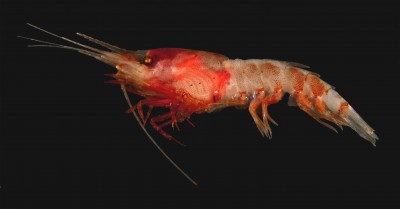NSU Newsroom
SharkBytes
Horizons
This version of NSU News has been archived as of February 28, 2019. To search through archived articles, visit nova.edu/search. To access the new version of NSU News, visit news.nova.edu.
This version of SharkBytes has been archived as of February 28, 2019. To search through archived articles, visit nova.edu/search. To access the new version of SharkBytes, visit sharkbytes.nova.edu.
Nova Southeastern University Researcher Receives Part of National Science Foundation Grant to Study Deep-Sea Life
More than $215,000 to Study Life at the Deepest Parts of the Oceans
FOR IMMEDIATE RELEASE
FORT LAUDERDALE-DAVIE, Fla. – They are among the most unique looking animals in the oceans – deep-sea creatures. Seemingly out of the latest sci-fi movie from Hollywood, these animals rely on a trait that’s incredibly rare on land (i.e. fireflies) but very common in the oceans – bioluminescence.
While we know that many sea creatures can actually “light up” to hide their shadows, we have no idea how they’re able to so closely match the light around them with their own bioluminescence. That’s where Tamara Frank, Ph.D., a researcher at Nova Southeastern University’s (NSU) Halmos College of Natural Sciences and Oceanography comes in.
Frank is joining Heather Bracken-Grissom at Florida International University and Megan Porter at the University of Hawaii in this research. Frank’s portion of the National Science Foundation grant is more than $215,000 over three years, while the total amount of the grant is $815,230.
What the research team will be focusing on is the evolution of bioluminescence and vision in deep-sea shrimp (Oplophoridae and Sergestidae), as well as how these primitive animals can so precisely control the intensity of their bioluminescence to match the downwelling light.
“For most of us, natural light ceases around 700 meters down, but many of these deep-sea animals have truly magnificent eyes, so they can still see at depths humans can’t,” Frank said. “However, there is so much bioluminescence down there that it’s probably the major stimulus for the visual adaptations we’re seeing.”
Frank said that she will be accompanied by NSU graduate students on upcoming research trips to the Straits of Florida. So little is known about these creatures because it is so difficult to bring up live, healthy deep-sea animals, but Frank has a trawl net designed specifically for this purpose.
Her research will focus on the physiological control of this complex system. There have also been some major advancements in genomic techniques, allowing the other members of the team to study the co-evolution of vision and bioluminescence in these animals.
Frank also said that the research team will develop molecular and organismal-based curriculum and workshops, working with local schools to bring this research to life for elementary through college-age students.
This material is based upon work supported by the National Science Foundation under Grant No. DEB-1556279.”
Be sure to sign up for NSU’s RSS feed so you don’t miss any of our news releases, guest editorials and other announcements. Please sign up HERE.
###
About Nova Southeastern University (NSU): Located in beautiful Fort Lauderdale, Florida, Nova Southeastern University (NSU) is a dynamic research institution dedicated to providing high-quality educational programs at the undergraduate, graduate, and first-professional degree levels. A private, not-for-profit institution with more than 26,000 students, NSU has campuses in Fort Lauderdale, Fort Myers, Jacksonville, Miami, Miramar, Orlando, Palm Beach, and Tampa, Florida, as well as San Juan, Puerto Rico, while maintaining a presence online globally. For more than 50 years, NSU has been awarding degrees in a wide range of fields, while fostering groundbreaking research and an impactful commitment to community. Classified as a research university with “high research activity” by the Carnegie Foundation for the Advancement of Teaching, NSU is 1 of only 37 universities nationwide to also be awarded Carnegie’s Community Engagement Classification, and is also the largest private, not-for-profit institution in the United States that meets the U.S. Department of Education’s criteria as a Hispanic-serving Institution. Please visit www.nova.edu for more information about NSU and realizingpotential.nova.edu for more information on the largest fundraising campaign in NSU history.
About NSU’s Halmos College of Natural Sciences and Oceanography: The college provides high-quality undergraduate and graduate (master’s and doctoral degrees and certificates) education programs in a broad range of disciplines, including marine sciences, mathematics, biophysics, and chemistry. Researchers carry out innovative basic and applied marine research programs in coral reef biology, ecology, and geology; fish biology, ecology, and conservation; shark and billfish ecology; fisheries s
cience; deep-sea organismal biology and ecology; invertebrate and vertebrate genomics, genetics, molecular ecology, and evolution; microbiology; biodiversity; observation and modeling of large-scale ocean circulation, coastal dynamics, and ocean atmosphere coupling; benthic habitat mapping; biodiversity; histology; and calcification. The college’s newest building is the state-of-the-art Guy Harvey Oceanographic Center, an 86,000-square-foot structure filled with laboratories; offices; seminar rooms; an auditorium; and indoor and outdoor running sea water facilities. Please visit cnso.nova.edu for more information.
March 4, 2016
Joe Donzelli | Office of Public Affairs
954-262-2159 (office) | 954-661-4571 (cell)
jdonzelli@nova.edu | www.nova.edu
